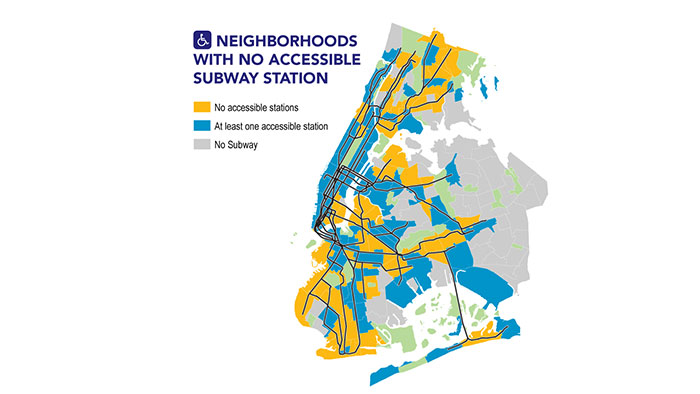By Forum Staff
While NYC’s subway remains the most expansive in the country, roughly half of the neighborhoods served by the system – 62 out of 122 – lack a single accessible station, according to a report released on Tuesday by City Comptroller Scott Stringer.
Fifty-five of those 62 “Americans with Disabilities Act Transit Deserts” are in Queens, Brooklyn, and the Bronx, according to “Service Denied: Accessibility and the New York City Subway System.” Combined, the 55 communities are home to 200,000 mobility-impaired residents, 340,000 seniors, and 200,000 children below the age of 5, Stringer noted.
Report highlights:
• For New Yorkers with disabilities and seniors, the housing crisis is magnified by ADA Transit Deserts which limit housing options and force mobility impaired New Yorkers to pay higher rents, according to Stringer;
• Median rents in neighborhoods with at least one accessible station are over $100 higher than in neighborhoods with only inaccessible stations;
• Given that people with disabilities or injuries, the elderly, and families with young children already bear heavy expenses for medical care and other services, these higher rents can be prohibitive, Stringer noted;
• Accessibility gaps can severely restrict opportunities for the mobility impaired;
• Those living in areas without accessible stations will struggle to reach the 2.7 million jobs in areas that are accessible by subway;
• The 608,258 jobs in neighborhoods without subway accessibility are even more challenging to reach;
• Barriers to the labor market already exacerbate the high rates of unemployment and low rates of workforce participation among those living with disabilities;
• In NYC, only 23 percent of the mobility impaired are employed or actively looking for work – compared to 74 percent of the non-disabled;
• For those who are participating in the labor force, unemployment rates are a staggering 16 percent for the mobility-impaired.
Fixing ADA Transit Deserts is going to take new funding, Stringer observed. In addition to offering support for the Metropolitan Transportation Authority’s new Fast Forward plan, Stringer said he’s calling for a new funding mechanism to support accessibility investments. “Service Denied: Accessibility and the New York City Subway System” recommends that the State Legislature introduce a new Transportation Bond Act in the next session and bring it to referendum. Voters have not had a chance to approve additional transit funding since 2005, when a $3.5 billion bond act was approved by voters, with proceeds divided fairly between upstate and downstate needs, Stringer said. A new bond act could vastly increase resources for ADA upgrades, dramatically enhancing the reach of the subway system and improving the lives of hundreds of thousands of New Yorkers, the comptroller noted.
“Too many New Yorkers are left stranded by the MTA. Decades of underinvestment and neglect have real life consequences. For every inaccessible station, there is a New Yorker who can’t get to work, pick up their children from daycare, or visit their doctors,” Stringer said. “It’s simple – a person’s livelihood should not be dictated by their mobility status, and we must take action immediately to address this crisis. The MTA’s Fast Forward plan is a step in the right direction, but we can and must do more.”

